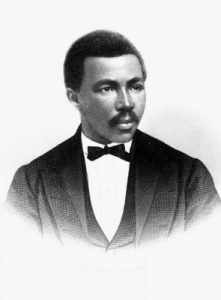Jan. 6, 1874: Robert B. Elliott Spoke of Need for Civil Rights Act
What you give to one class you must give to all. What you deny to one class, you deny to all.
On Jan. 6, 1874, Congressperson Robert B. Elliott of South Carolina gave a speech to advocate for the Civil Rights Act.
Elliott was a lawyer and commanded the South Carolina National Guard to protect Black citizens from the KKK. Below are a few excerpts from his speech which was so powerful that it was memorialized in an 1874 lithograph.
. . . In this discussion I cannot and I will not forget that the welfare and rights of my whole race in this country are involved. When, therefore, the honorable gentleman from Georgia [Democrat Alexander Stephens] lends his voice and influence to defeat this measure, I do not shrink from saying that it is not from him that the American House of Representatives should take lessons in matters touching human rights or the joint relations of the State and national governments.
While the honorable gentleman contented himself with harmless speculations in his study, or in the columns of a newspaper, we might well smile at the impotence of his efforts to turn back the advancing tide of opinion and progress; but, when he comes again upon this national arena, and throws himself with all his power and influence across the path which leads to the full enfranchisement of my race, I meet him only as an adversary; nor shall age or any other consideration restrain me from saying that he now offers this Government, which he has done his utmost to destroy, a very poor return for its magnanimous treatment, to come here and seek to continue, by the assertion of doctrines obnoxious to the true principles of our Government, the burdens and oppressions which rest upon five millions of his countrymen who never failed to lift their earnest prayers for the success of this Government when the gentleman was seeking to break up the Union of these States and to blot the American Republic from the galaxy of nations.
Sir, it is scarcely twelve years since that gentleman shocked the civilized world by announcing the birth of a government which rested on human slavery as its corner-stone. The progress of events has swept away that pseudo-government which rested on greed, pride, and tyranny; and the race whom he then ruthlessly spurned and trampled on are here to meet him in debate, and to demand that the rights which are enjoyed by their former oppressors—who vainly sought to overthrow a Government which they could not prostitute to the base uses of slavery—shall be accorded to those who even in the darkness of slavery kept their allegiance true to freedom and the Union
Technically, this bill is to decide upon the civil status of the colored American citizen: a point disputed at the very formation of our present Government, when by a short-sighted policy, a policy repugnant to true republican government, one negro counted as three-fifths of a man. The logical result of this mistake of the framers of the Constitution strengthened the cancer of slavery, which finally spread its poisonous tentacles over the southern portion of the body-politic.
To arrest its growth and save the nation we have passed through the harrowing operation of intestine war, dreaded at all times, resorted to at the last extremity, like the surgeon’s knife, but absolutely necessary to extirpate the disease which threatened with the life of the nation the overthrow of civil and political liberty on this continent. In that dire extremity the members of the race which I have the honor in part to represent—the race which pleads for justice at your hands today, forgetful of their inhuman and brutalizing servitude at the South, their degradation and ostracism at the North—flew willingly and gallantly to the support of the national Government. Their sufferings, assistance, privations, and trials in the swamps and in the rice-fields, their valor on the land and on the sea, is a part of the ever-glorious record which makes up the history of a nation preserved, and might, should I urge the claim, incline you to respect and guarantee their rights and privileges as citizens of our common Republic.
But I remember that valor, devotion, and loyalty are not always rewarded according to their just deserts, and that after the battle some who have borne the brunt of the fray may, through neglect or contempt, be assigned to a subordinate place, while the enemies in war may be preferred to the sufferers. The results of the war, as seen in reconstruction, have settled forever the political status of my race.
The passage of this bill will determine the civil status, not only of the negro, but of any other class of citizens who may feel themselves discriminated against. It will form the cap-stone of that temple of liberty, begun on this continent under discouraging circumstances, carried on in spite of the sneers of monarchists and the cavils of pretended friends of freedom, until at last it stands in all its beautiful symmetry and proportions, a building the grandest which the world has ever seen, realizing the most sanguine expectations and the highest hopes of those who, in the name of equal, impartial, and universal liberty, laid the foundation stones. [Read in full at “Speeches of African-American Representatives Addressing the Civil Rights Bill of 1875,” starting on page 7 of the PDF.]
The Civil Rights Act was passed a little over a year after this speech, on March 1, 1875.
When the federal troops were withdrawn from South Carolina in 1877, Elliott was forced from office. He died in poverty on August 9, 1884 at the age of 41.



No comments:
Post a Comment